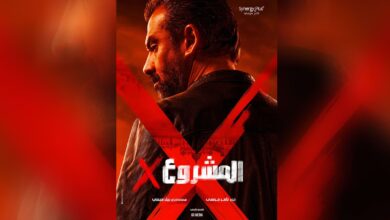To movie star Asser Yassin, life is a matter of choice. The mechanical engineering graduate who was too shy to go to auditions took the lead role in well-known director Dawoud Abdel Sayed’s latest film, Rasayel el-Bahr ("Messages from the Sea"), and excelled in it.
In ‘Messages," Yassin plays Yehia, a young doctor whose stuttering problem makes him a social outcast until he is left totally alone to experience life. From the way he walks to the way he stutters, Yassin’s acting techniques reveal simplicity yet depth, effortlessly and subtly reflecting the richness of his character.
Making his stage debut back in 2000 at the American University in Cairo (AUC), Yassin soon made his way to the silver screen and has since starred in numerous films, including Omaret Yakoubian (2006); Halim (2006); El-Gezira (2007); Ala Ganb ya Osta (2008); Zay el-Naharda (2008); Ehna Etabelna abl Kedda (2008); Geninet el-Asmak (2008); and El-Waad (2008).
Al-Masry Al-Youm talked to Asser Yassin about his first movies, his latest role and the long journey in between.
Al-Masry Al-Youm: In what way does this role differ from other roles you have played?
Asser Yassin: It’s true this role is different from all other roles I’ve played, despite their variety, because this is a different genre of film in general. It’s unique; it took seven years to make. I thank God that I had a chance to take part in it. It was my dream to star in one of Dawood Abdel Sayed’s movies.
Al-Masry: Do you think there are a lot of constraints when it comes to acting in Egypt?
Yassin: Everywhere it’s the same: it’s difficult, and it should be. However, nowadays, you have numerous channels for exposure. You have short films, and directors watch those films [in search of new talent]. I was picked out from a short film. Acting studios–like Khalid Galal’s, Ahmed Kamal’s and Abdel Hadi’s studios, along with El-Warsha Art Troupe, directed by Hassan el-Geretly–are all great channels that showcase a lot of actors who are then filtered out.
If an actor is not good, he or she will not succeed. It’s about consistency. It’s how much you can stand, how much you love it and how true you are.
Al-Masry: How did you start out? Were there any difficulties?
Yassin: I started out with prominent director Khairi Beshara in a television series. When you start with someone like him, you are very grateful. He’s a man who lets you focus on real acting, and this is what lead me to Dawood Abdel Sayed. I was a fresh AUC graduate who had studied engineering. I knew I was good at acting and that I only needed a chance.
But apart from talent, and acting, there are things that you need to learn. When you start from the bottom, you learn a lot. When you start from the top, you miss out on a lot of things that you need to learn about the people around you–how they treat you, who wants to take advantage of you, who wants to help you.
If I had started in cinema with leading roles, I would have never settled for smaller roles. I started small, then I took on leading roles. On the other hand, things to me are very spiritual and depend on fate, which is beyond our control. People might say or think that I’m a very good planner, but I don’t plan–I just choose.
Al-Masry: Did you ever take acting classes?
Yassin: No, I never took acting classes and I never would have auditioned. I was too shy to audition. I didn’t even know I wanted to act. One day a friend of mine–who knew that I loved cinema–asked me to take a role to substitute for another actor. I had one line only, just one word on stage–and it was brilliant. I felt the energy. It was addictive. You stay in the character for some time and it’s yours, and it dies when you stop doing it because no one else can do it but you.
I performed in a lot of plays at AUC. Before I graduated, I decided I wanted to be an actor. I worked as an assistant at the university so that I would be close to the theater. But in front of my family, I was an assistant. I went to a lot of "auditions" at multinational companies, but when it came to signing a contract I ran away.
A lot of people thought I was crazy; thought I was gambling on something that did not yet exist. People would tell me that I was going to wait seven years to get a good role. Others would say that in five years I would be a star. I didn’t see then that there was a progression.
So I was waiting yet not waiting, working on myself in the meantime. I went through phases of depression and self assessment. I read a lot, drew, learnt a lot–but never worked as an engineer.
Al-Masry: Is acting a difficult profession?
Yassin: It’s just like the sound equalizers, with which you control the pre-sets. Acting is like toying with the equalizer. The normal Asser has a certain amount of anger, jealousy and tolerance, which increase or decrease according to the character he plays. Once I finish a film, to go back to my pre-set character is a bit annoying. The only way I can go back is through my family. In a way, I see myself through them.
Al-Masry: What about independent short films?
Yassin: I have worked in several independent short films, such as Beit men Lahm, Cryptic reflections, Tornado and others. I learnt a lot from them. You learn about lighting techniques and microphones, for example, and to focus among the many people on set. Once such experience is installed, you synchronize. It took me some time to understand.
So independent short films helped me a lot, and so did television serials, where you have two cameras. Just like with writing, now you have your own vocabulary and you can stylize as well. Each step leads to the next. If I hadn’t acted in El-Waad, I wouldn’t have starred in Rasayel el-Bahr. I feel an artistic maturity moving from this to that.
Yassin: How do you see contemporary Egyptian cinema?
Al-Masry: I will quote director Khayri Beshara, who said that "cinema reaches its peak when a country reaches the worst socio-economic status." To me, this applies to Dawoud Abdel Sayed’s latest film. One hasn’t seen a film like this in seven years. Besides, there is new blood coming in–be it in the form of actors, directors, editors or script writers. There is always hope.
Al-Masry: What are you working on these days?
Yassin: I’m shooting a new film called Aswar el-Amar, starring Mona Zaki and Amr Saad and directed by Tarek el-Eerian. The script is written by Mohammed Hefzi.




